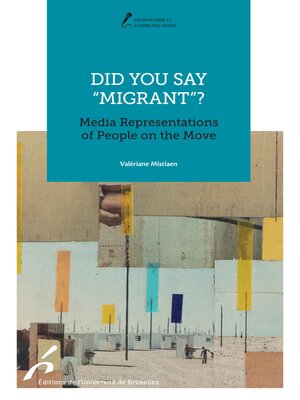
Sign up to save your library
With an OverDrive account, you can save your favorite libraries for at-a-glance information about availability. Find out more about OverDrive accounts.
Find this title in Libby, the library reading app by OverDrive.



Search for a digital library with this title
Title found at these libraries:
| Library Name | Distance |
|---|---|
| Loading... |
The 2011 war in Syria triggered a wave of people seeking asylum in Europe, bringing immigration into the political and media spotlight and sparking numerous debates on displaced people. These debates have been marked by a heightened focus on the terminology used to describe people on the move. Terms such as refugee, migrant, immigrant, asylum seeker, illegal immigrant, and displaced person have circulated in the media, often blurring our understanding of events or conveying contradictory representations of those involved. Moreover, the words used to define people on the move are not fixed in time; their meaning and reference emerge from events and social representations, shaping both the public issue of migration and the image of the social actors concerned.
Using a discursive approach that combines discourse analysis and corpus linguistics, this book examines how the Belgian media referred to displaced people. It is innovative in three key ways. Firstly, it analyses media coverage in both the French- and Dutch-speaking communities of Belgium, allowing for comparisons of how migration was represented in two culturally, linguistically, and politically distinct regions of the same country. Secondly, it studies both written and audiovisual media, drawing on an extensive dataset of 13,391 press articles and 3,490 television news items. Finally, it goes beyond the most commonly used terms related to migration, exploring a significantly broader range of designations than have previously been studied.
This book contributes to the understanding of how language shapes social debates and is an essential resource for anyone interested in the multilingual analysis of media texts.
Using a discursive approach that combines discourse analysis and corpus linguistics, this book examines how the Belgian media referred to displaced people. It is innovative in three key ways. Firstly, it analyses media coverage in both the French- and Dutch-speaking communities of Belgium, allowing for comparisons of how migration was represented in two culturally, linguistically, and politically distinct regions of the same country. Secondly, it studies both written and audiovisual media, drawing on an extensive dataset of 13,391 press articles and 3,490 television news items. Finally, it goes beyond the most commonly used terms related to migration, exploring a significantly broader range of designations than have previously been studied.
This book contributes to the understanding of how language shapes social debates and is an essential resource for anyone interested in the multilingual analysis of media texts.







